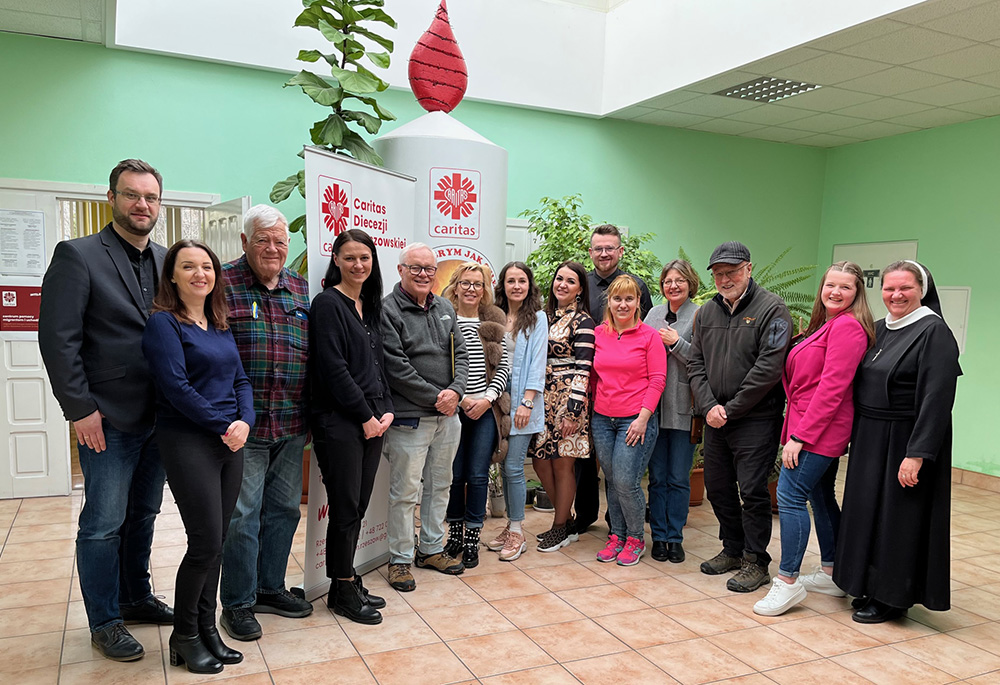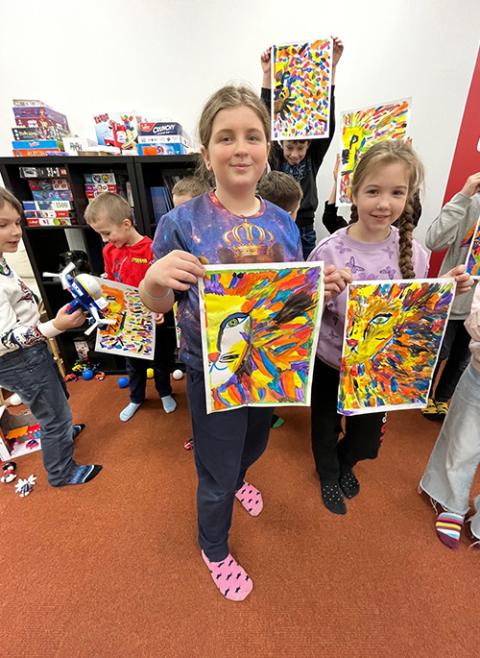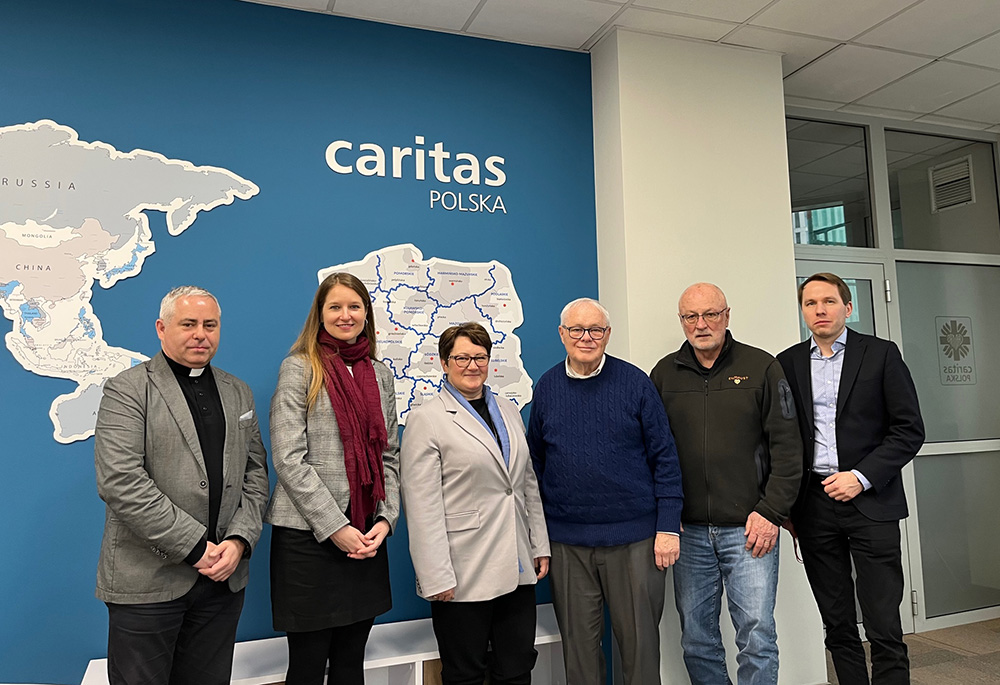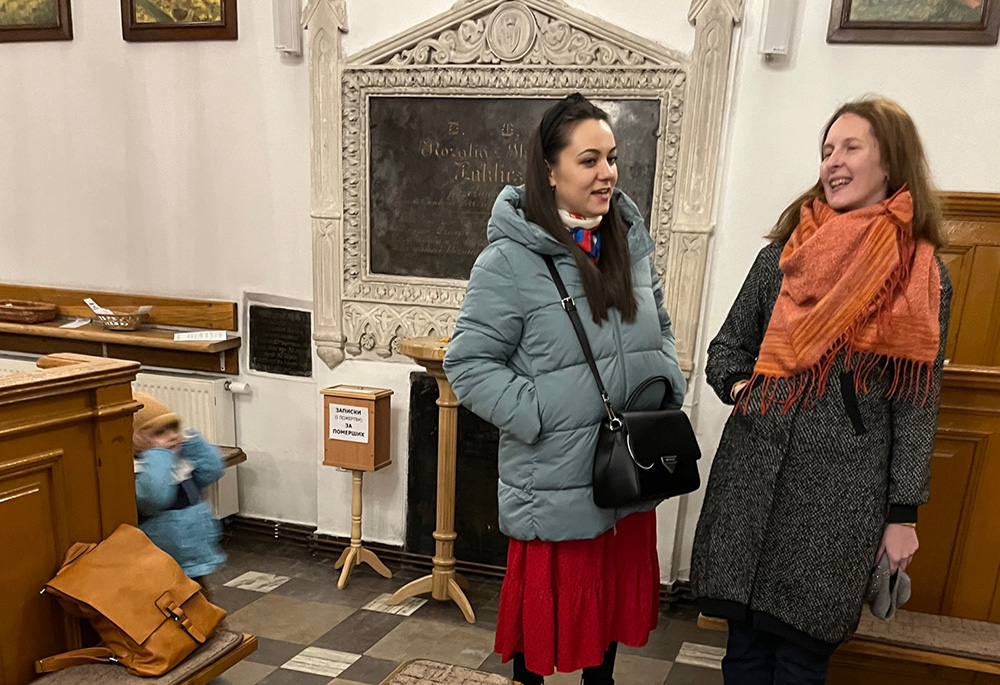
Caritas Poland staff and psychologists in Rzeszow are pictured with visitors from the U.S., including Jim McDermott, former U.S. representative, third from the left; NCR contributor Fr. Peter Daly, fifth from the left; and NCR board member David Bonior, former U.S. representative, third from the right. (Courtesy of David Bonior)
Editor's note: In March 2023 former Michigan Congressman David Bonior and former U.S. Congressman Jim McDermott, also a psychiatrist, traveled to Poland and Ukraine with Fr. Peter Daly, a retired Catholic Priest who is also an immigration lawyer. Accompanying them was Tanya Keppler, an IT specialist. This group of four spent two weeks talking with Ukrainian refugees and Polish and Ukrainian caregivers of refugees. This is one of several pieces they have written and lectured on since their return from Europe.
The best of the Catholic Church is outside of Rome and often found in the churches concerned for the poor and marginalized, in places like the barrios of Latin America, the crowded streets of India, and these days at border points and inside Poland where Ukrainians fleeing war have found refuge in the homes and hearts of their neighbors.
More than 13 million Ukrainians have crossed the border into Poland since the full-scale invasion from Russia began February 24, 2022, according to figures from the United Nations High Commissioner for Refugees. That includes more than 185,000 Ukrainians who recently entered Poland after Russia started bombing Odesa in mid-July 2023.
What makes the Polish response so impressive is that it's a sign of overcoming the historic enmity between the Polish and Ukrainian people, the scope of the rescue, and the tone in which the gifts of welcome and safety are given under the NATO umbrella.
For most of the 20th century, many Poles and Ukrainians did not much like each other. Between 1918-20 they fought each other to create independent states in Eastern Galicia. In 1943, Polish villagers in Volhynia were murdered and the following year in Eastern Galicia, tens of thousands of Poles died at the hands of the Ukrainian Insurgent Army. In acts of retribution, the Poles killed tens of thousands of Ukrainians.
Growing up, I recall the coolness between my Polish father and Ukrainian grandfather. They coexisted in the same house for the sake of our family, but I always felt a tension, a cold war filtered into our family.
More recently those attitudes have markedly changed. Both have concluded their common enemy is Russia. Today, Polish support for Ukraine has eclipsed expectations, something I witnessed during a March trip to Poland and Ukraine, where my visit included a close-up look of the valiant work of Catholic sisters.
In Krakow, Dominican Sr. Margorite Laken (or Sr. Margaret Lekan, as GSR reported here) and her sisters put together a financial program to help migrating young mothers with infants and small children. Eighty families are receiving help. In addition, 600 Dominican nuns from around the world traveled to Ukraine and surrounding countries to assist in the rescue.
Also in Krakow, the congregation of the Sisters of Charity of St. Vincent de Paul, led by Sisters Vera and Marta helped to bring families to their convent house. This went on for months along a network of convents and monasteries that stretched from southern Ukraine to the Polish border, including a monastery in Snyatyn, Ukraine, the town where my grandfather was raised. When they reached Krakow, hundreds were housed in monasteries and cared for through Caritas and government programs. Acting as shepherds, the sisters saved many lives.
At the international political level, the Poles have been the Ukrainians' strongest European ally. Supporting them with a "Temporary Protection Directive" while also supporting Ukrainian borders, Poland has been a forceful and consistent supporter of having Ukraine join NATO and the European Union.
Advertisement
At the civilian level, Poles like Sebastian Stachowski, who testified July 26 at the U.S. Capitol before a congressional committee investigating the abduction of Ukrainian children, recalled how he went from being chief executive officer of an environmental consulting agency to "almost overnight, I became a crisis response volunteer working for the Carpathian Red Cross." Along with other fellow Poles, he said he helped organize blood drives and efforts to clothe and feed the Ukrainians fleeing the horror of Russia's full-scale invasion to help "counteract a crisis of this scale."
"The Polish people have big hearts," said Renata Makuch, the director of the Caritas center Fr. Peter Daly and I visited in Warsaw. "Ukrainians need help as our brothers and sisters. Poles feel brotherhood and sisterhood toward Ukrainians."

Children show off their artwork at a day care at the Caritas center in Warsaw, Poland. (Courtesy of David Bonior)
Some of what has occurred in Poland in 2022-23 was made possible by the close working relationship of the Catholic Church, especially the church's charitable arm, Caritas, which has worked in collaboration with the Polish government at the national and regional levels. There has also been cooperation and collaboration with nongovernmental organizations like Razom, which means "together" in Ukrainian.
Catholic network
Poland is a predominantly Catholic country, perhaps the most Catholic in Europe. There are more than 10,000 Catholic churches and parishes in Poland, along with a network of convents, monasteries, retreat centers, and hospitals. A spiritual army of clerics, religious, and laity — using convents, monasteries, churches, and parish homes — have met the challenge of hosting desperate migrants from all corners of Ukraine. The community that has emerged from this marriage of neighbors is quite Christ-like.
Is it possible that it might be a cornerstone of rebuilding Catholicism in Europe? The spotlight of Polish Samaritan justice is there to remind us of the good works so many in the church are engaged in. I felt a Catholic pride blossoming with each new visit we made in Poland.
We saw some of the 32 Caritas centers throughout Poland that have provided shelter, food, clothing, counseling, job placement, day care facilities, school placements, language classes, and psychological help and other medical needs of the refugees.
In recent decades, Polish and Ukrainian leadership were blessed by exceptional figures. Lech Walesa defiantly led the worker uprising with his Solidarity movement. Pope John Paul II, then Polish Cardinal Karol Wojtyla, is revered for his leadership in breaking communism in Poland and paving the way for its downfall throughout Europe. And now Ukraine is being led by a courageous Jewish comedic actor turned politician and military leader, President Volodymyr Zelenskyy.
There is no doubt that the Catholic Church and the heroic work of its members and organizations have been behind the scenes carrying out the day-to-day work of helping a massive rescue operation. Caritas Poland, for instance, has been central in the relief effort for the largest migration in Europe since World War II. "The organization has raised millions of euros to help dioceses address the crisis in their areas," said Fr. Marcin Izycki, director of Caritas Poland.

Fr. Marcin Izycki and the leadership of Caritas Poland are pictured in this photo; U.S. visitors Fr. Peter Daly and David Bonior are also pictured, third and second from the right. (Courtesy of David Bonior)
In the first 30 days of the invasion in February 2022, Poland sent 500 trucks filled with food, medicine, and electric generators. During the first year of the Russian invasion, 31,000 Caritas volunteers aided 2 million refugees with an aid value of about 600 million PLN. "The people of Poland opened their hearts and their wallets," Izycki said.
Also notable is what is not present in Poland even with the massive influx of refugees. Msgr. Peter Vaccari, the president of the Catholic Near East Welfare Association, exclaimed to us in an astonished tone, "There are no camps!" That is unheard of for a migration of this magnitude. I thought to myself, "It's like the loaves and fishes provided by Jesus at the wedding in Cana. The miracle of giving and sharing just grew as the demand grew. There were no migrant camps, no refugee camps, no tented camps, just a loving community."

Ukrainian refugee mothers sing old Ukrainian songs in the Greek Catholic Church of Holy Mother of God in Rzeszow, Poland. (Courtesy of David Bonior)
In Rzeszow, Poland, Fr. Bohdan Kryk, pastor of the Greek Catholic Church of Holy Mother of God, opened the church doors to a few young mothers, infants and toddlers during the first month of the invasion. Now that handful has become 200 as a community was born and has flourished. Now each woman helps a newly arrived sister-in-need. Their charity was contagious and has acted as a glue to bond these women together.
The generosity of the Catholic Church in Poland may end up being the church's salvation. After decades of scandal regarding sexual abuse, and the church's refusal to recognize divorced Catholics, or allow women their rightful place on the altar, or opening the church to gay worshipers, there is this other side of the church, the side I like to think Christ might lead.







